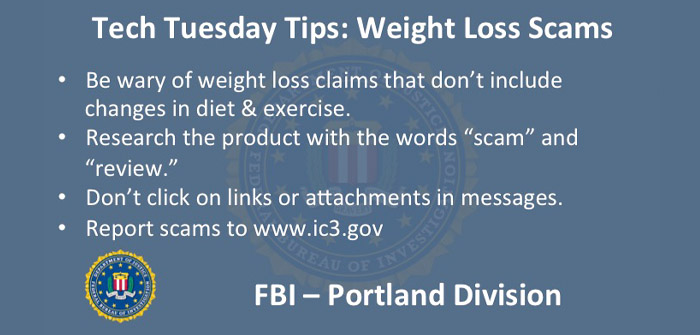We are in the heat of the summer, and you really want to head to the pool or the beach. Problem is that you just aren’t happy with how you look in that swimsuit that looked cute in the store months ago. You’ve thought about diet and exercise, but those can be hard to get started and harder to maintain. Maybe you see a late night ad on TV or — better yet — get an email or see a social media post from a friend with information on a great new option. It worked for some random online friend, it can work for you, right?
Here’s the problem: scammers will often hack into email accounts and social media accounts, sending messages to that person’s friends and followers. The message will include a fake testimonial about how this new miracle weight-loss option worked for her. The message will often also include a fake celebrity endorsement to make it seem more legitimate. You click on the link — which can load malware onto your device — and then you freely give up your credit card info. You want to lose weight, but, in the end, the only thing you end up losing is your money.
Our friends at the Federal Trade Commission have a few tips to help you avoid this scam:
- Avoid clicking on links or opening attachments, even if they appear to come from someone you know.
- Be wary of weight loss claims that do not include exercise and a change in diet. Anyone saying that they lost more than a pound a week, without changing anything, is probably not telling the truth.
- Learn how to spot fake news sites. They often include fake celebrity endorsements, supposed satisfied customer endorsements, and dramatic weight loss claims.
- Before buying a product, do your homework. Research the name of the product with words such as “scam”, “complaints” and “reviews.”
Bottom line — while those weight-loss ads may be appealing, avoid any pill, cream, or drink that promises weight loss with zero effort.
As always, if you have been a victim of an online scam, report it to the FBI’s Internet Crime Complain Center at ic3.gov or call your local FBI office.



